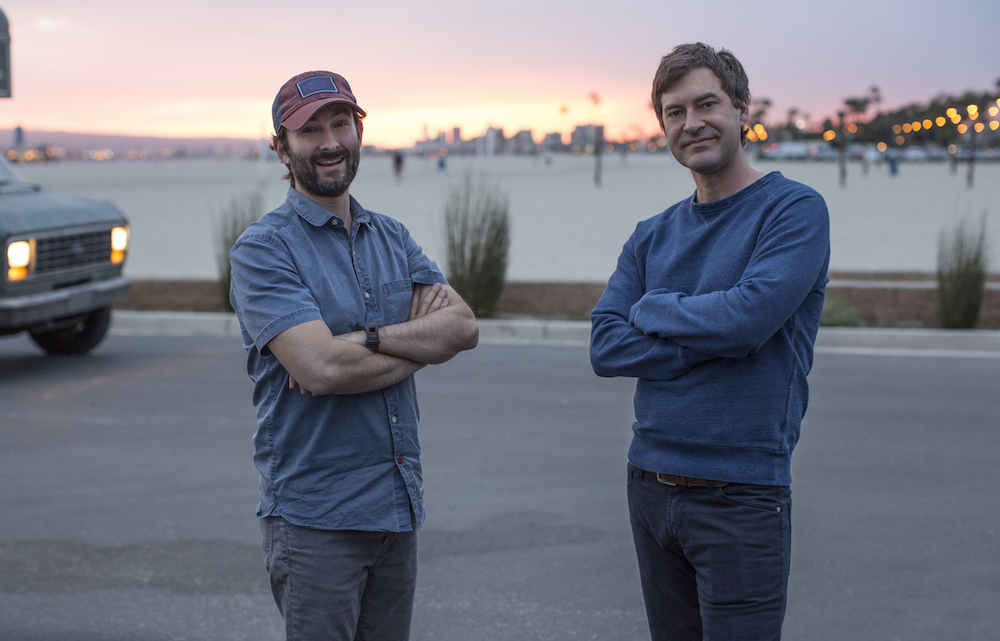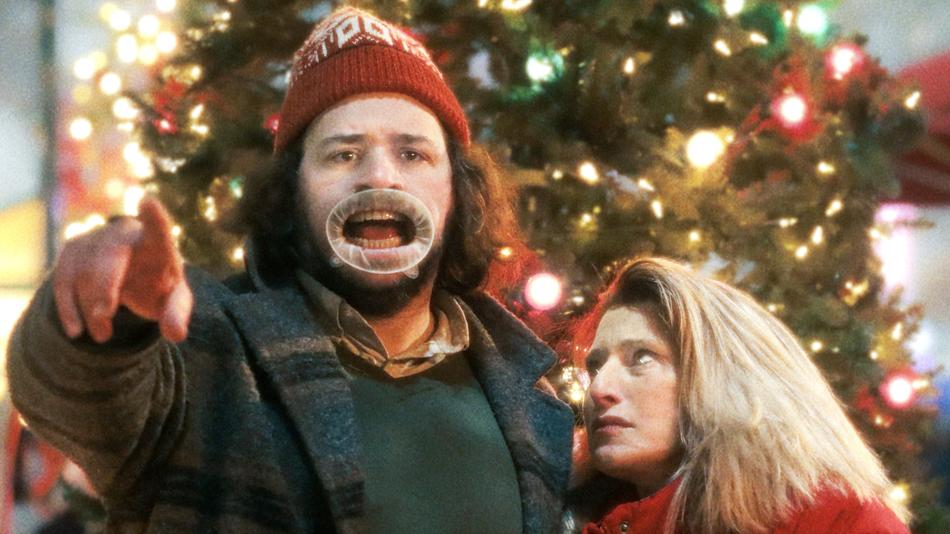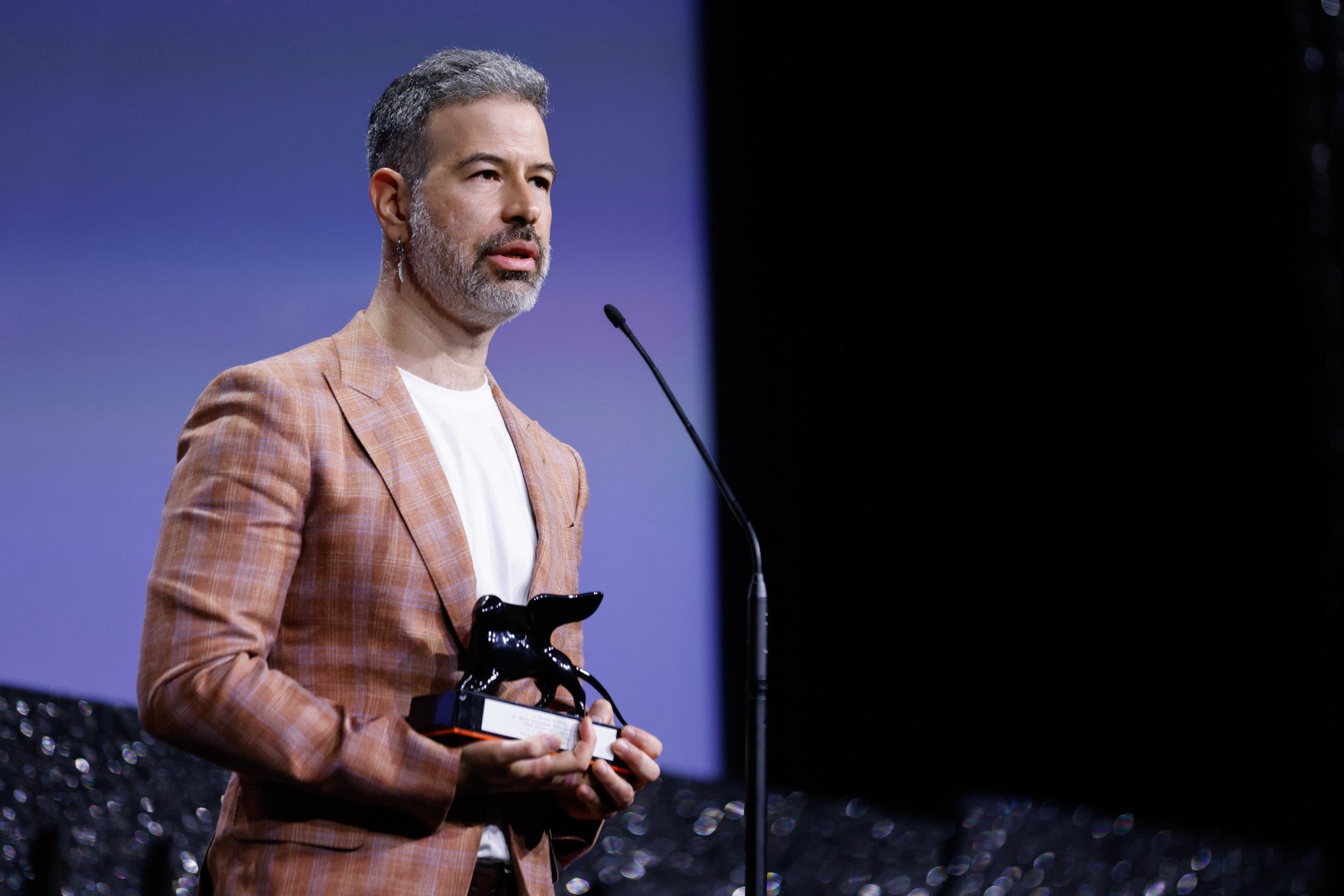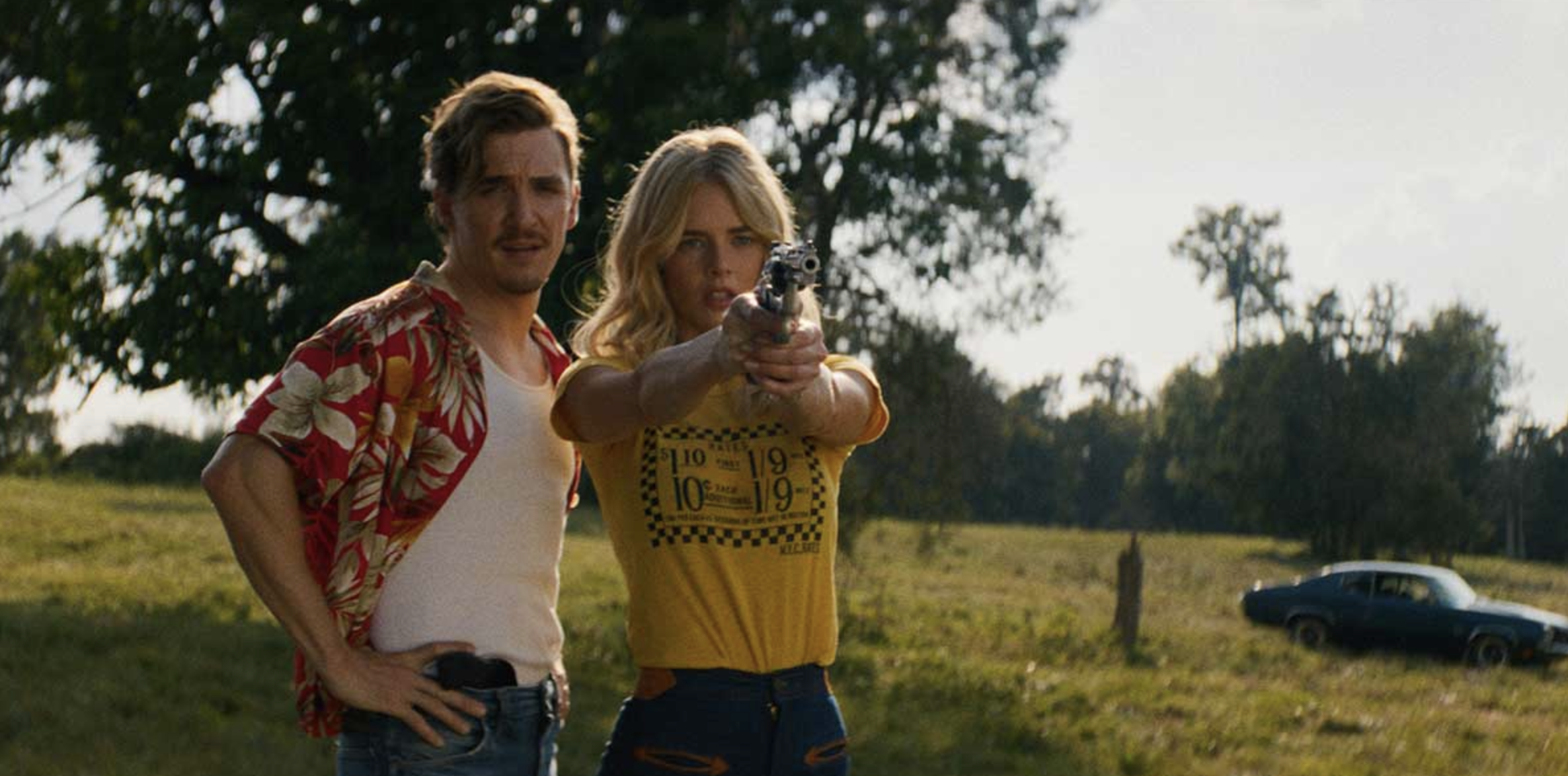When Joel Coen went solo he co-wrote “The Tragedy of Macbeth” with his wife Frances McDormand. When Ethan Coen went solo he co-wrote “Drive-Away Dolls” and “Honey Don’t” with his wife Tricia Cooke. When Josh Safdie went solo he co-wrote “Marty Supreme” with Ronald Bronstein. (Benny wrote his solo movie “The Smashing Machine” by himself.) And when Jay Duplass went solo he co-wrote the romantic comedy “The Baltimorons” (September 5, IFC) with new writing partner Michael Strassner, who stars in this Baltimore Christmas fable inspired by the comic’s own story. The movie took home the audience award at SXSW.
It’s been 14 years since Jay and Mark Duplass directed an original movie together. They still produce together (“Togetherness”) and act in various projects, including in Jay’s case, “Transparent,” “Dying for Sex,” and “Industry.” But Jay has been itching to get back into the director’s chair — and Mark hasn’t.
We talked about Jay’s return to the director’s chair with “The Baltimorons” on Zoom. “Look, all I ever wanted to do was be a Coen brothers,” Jay Duplass said said. “After I saw ‘Raising Arizona’ in 1987, I just wanted Mark and I to be the Coen brothers 2.0. We tried to be them. We failed. We got to do five movies in our own little documentary-style way from 2005 to 2011, but so many things co-opted that momentum. One of them is my brother becoming a famous actor. Another one was we entered the mini-major world right when it started to decline. We made ‘Cyrus’ with Fox Searchlight in 2010. And ‘Jeff Who Lives at Home’ with Paramount Vantage, and things were closing up. Big marquee filmmakers started coming into that space, because that was the only vestige for them. And and then we started doing premium TV. We did ‘Togetherness,’ because it was a way for more up and coming filmmakers to make money doing TV and I got cast in ‘Transparent,’ and accidentally became an actor.”
Directing was all that Jay had ever wanted to do. But as the years ticked by, about seven years in, they realized: Jay wants to make movies. Mark doesn’t.
“[With] directing, you’ve got to really fucking want it,” he said. “You have to want it bad because it’s so consuming. I always joke that it comes out to minimum wage at the end of the day, because it’s the amount of detail, if you’re going all the way with it. And it became clear that that’s not what Mark wanted to do, and it was what I wanted to do.”

The untangling was complicated. The brothers had to break up officially as directors in the DGA. “You get a divorce,” he said. Then Duplass went into scriptwriting mode. And then the pandemic hit. “At that point in time, a Covid budget for an independent film cost more than the freaking independent film,” he said. “So that didn’t happen. I was ready to go. And that ended. And then the strikes came. A couple of years ago, I had woken up to: ‘I haven’t made a movie in over a decade. I’m 50 years old. People are not excited about movies right now.’”
“Making movies is my thing,” he said. “Ultimately, I needed to design a movie that couldn’t be stopped. It needed to be able to be paid for by myself. And luckily, Mark helped me with it, and he produced it and supported me. But I ultimately had to find what I was going to do. And went back to the old, old days of “The Puffy Chair.’ What do I have? At that time: I have my brother, I have his girlfriend, I have my friend. We have a van. They’re desperate to make their lives come together. This is what we have, available materials, method of filmmaking.”
Michael Strassner was the new element. Duplass discovered him on Instagram. “I curate it heavily,” said Duplass. “It’s just comedy. That’s all it is. It’s just comedy bumps. So Michael Strassner started coming over the airwaves, and in the pandemic, he was just making me laugh, this giant, sensitive, sweet, heartfelt guy in the body of a 1970s NFL linebacker. I followed him, he DMed me. I mentored him and his short film, and I started to realize how smart he was. He was much more than just a big improv actor. I learned about his suicide attempt and how that got him sober and how the only reason he was still alive is because the belt broke.”
That’s how “The Baltimorons” starts. Strassner also told Duplass about how he came up in Baltimore, and how he had some friends there who were languishing through the pandemic and the strikes, and just wanted to make a movie, and how nobody had made a movie in Baltimore in a long time that was about Baltimore. “It started coming to me,” said Duplass. “This is the movie that I can get back in. But even still, independent films are off-off Broadway now. I’m probably going to lose money on this. This is going to be a shot in the dark to see if I can remind people that I do know how to make movies.”
Duplass knew he wanted Strassner to be in the movie. But he also knew that they needed to write it together. “It’s his origin story,” Duplass said, “and he knows everything about Baltimore. He knows everything about getting sober. He knows everything about sketch comedy. That’s the landscape of the movie.”

Strassner’s romantic interest is Liz Larsen, a Broadway actress who starred in “Transparent: The Musical.” “She was a freaking knockout, jaw-dropping, knock your socks off, funny, heartfelt, made me laugh, made me cry,” said Duplass. He went backstage and said: “I’m going to make a movie with you one day.” And she said: “Yeah, right.”
Duplass sat down with her at the end of the strike, and said, “I’m about to fall off a cliff and never be a movie-maker again, and I’m going to go to Baltimore and make a movie. I want you to do it with me.”
In “The Baltimorons,” Strassner’s character has a medical emergency on Christmas Eve and winds up with the only workaholic dentist in Baltimore. Through a string of hilarious circumstances, the older woman keeps having to drive him places, and as she doesn’t have any plans herself, she goes along for the ride.
“It’s an adventure through Baltimore on Christmas Eve,” said Duplass. “They are both shut out of their family holiday events, and it looks like it’s going to be the worst Christmas ever. And the movie is about their unusual partnership in terms of getting stuck together on Christmas Eve and trying to figure out if they can make some lemonade out of some serious lemons. We do a low-stakes heist scene where he has to get his shitty Cadillac out of a tow lot that’s been shut down because it’s holiday season.”
Larsen makes a magnetic leading lady. There’s a line in the movie where she says, “You know, when I turned 50, I hit menopause, I became a grandmother, and my husband left me for a younger woman. Boom, boom, boom. I don’t even know who the fuck I am anymore.”
Duplass incorporated not only some of Strassner’s story, but Larsen’s as well. “She is this tiny little thing that’s a total spitfire,” said Duplass. “Tough as nails. We’re out in Baltimore running around the streets in the middle of the night in 18 degree weather. We did not have any trailers or warming tents or anything.”
In many ways it would have been easier to continue working as a pampered Hollywood actor for hire. But it felt good to be back in the director’s chair. “I’ve always taken the lead as the director,” said Duplass. “The writing part was scary. I was terrified that I was going to make a movie, and it was going to suck, and then everybody was going to be: ‘Oh, Mark was the special sauce.’ I got to experience that thing that everybody always told me: Hollywood is not about what have you done? It’s what have you done lately? And I had the double whammy of: Who knows if Jay can make a good movie without Mark?”
When “The Baltimorons” didn’t get into Sundance, Duplass thought, “Maybe it’s over,” he said. “Maybe this movie is not what I want it to be and is not going to do what I need it to do.” While “The Baltimorons” has some dark edges, from the suicide attempt to the serious loneliness both characters are struggling with, it’s ultimately a sweet feel-good flick. And it has a strong Metascore: 76. The movie went on to win the SXSW audience award “against movies with significantly higher budgets and with famous people in them,” he said. “This movie is the biggest crowdpleaser of any movie that I’ve made.”
After SXSW, they made their money back when they landed a theatrical deal with IFC and Sapan Studio. The question for indies like Duplass remains: “How do we get independent filmmaking back into movie theaters?” he said. “And how do we get people back into independent film in movie theaters?”
Next up: Duplass is acting in Toronto in Megan Park’s follow-up to “My Old Ass,” TV series “Sterling Point.” And Duplass filmed his second solo feature, true story “See You When I See You,” at the end of last year and is finishing it up before submitting to festivals. Produced by Kumail Nanjiani and Emily Gordon, the film stars Cooper Raiff, David Duchovny, Hope Davis, and Kaitlyn Dever.
True stories are one way to differentiate the authentic from the fake. “‘The Baltimorons’ is a fictionalized version of Michael’s life, but the origin story is real,” said Duplass. “The origin of Liz’s story is real. It honors two people’s real lives. It comes through.”



